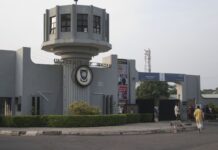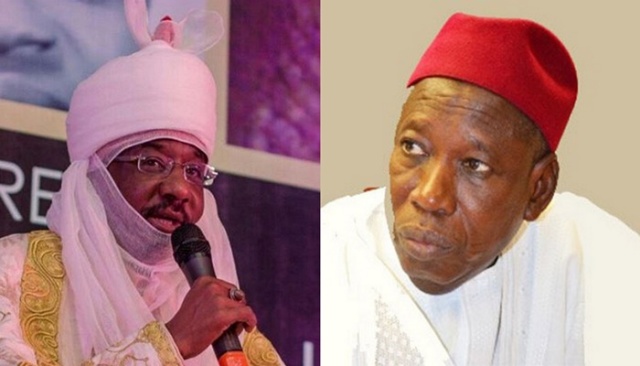Jiti Ogunye
By a letter dated March 9, 2020, and addressed to Emir of Kano, Muhammed Sanusi II, issued and signed by the Secretary to the State Government, Kano State, Usman Alhaji, the Emir of Kano, Muhammed Sanusi II (Sanusi Lamido Sanusi ) was communicated that he had been deposed from the throne of Emir of Kano by the Kano State Government.
The letter stated that the Kano State Executive Council during its meeting on March 9, 2020, approved of and directed the immediate removal and dethronement of Emir Sanusi as the Emir of Kano, and also his relocation to Nasarawa State, an act which the letter claimed was done in line with the relevant provision of the Kano State Emirate Council Law of 2019. The letter further stated that the decision to depose the Emir was taken due to the Emir’s general disrespect to lawful instructions from the authorities, including ( the ) President, and refusal to attend official programmes and meetings organized by Government, acts which were viewed as an act of insubordination. The letter claimed that the decision to depose the Emir was reached to safeguard the sanctity, culture, tradition and prestige of the Kano Emirate which was established and sustained over “one thousand years ago”.
Following the delivery of the letter on the deposed Emir, he was “arrested”, “forcibly removed” by a horde of security agents, including (reportedly) the Kano State Commissioner of Police, and flown out of Kano into exile. Contemporaneously, a new Emir of Kano, Aminu Ado Bayero, until March 9, 2020, the Emir of Bichi in Kano State, was announced in the stead of the dethroned Emir, and given his staff of office. A fait accompli, so to speak.
Although the letter of dethronement of Muhammed Sanusi II did not indicate the location of his exile, it was reported that he was being exiled to Loko in Nasarawa State. It is, thus, safe to assume that there is an executive order or instrument, stipulating the location of his banishment, conditions of his restriction in that location and the duration of his exile. There are unconfirmed reports that upon arrival in Nasarawa State, the Nasarawa State Government has taken a decision to “resettle” the Deposed Emir at Awe, Nasarawa State instead of Loko, as initially indicated.
Upon being informed about his deposition, and while the order for his physical removal from the palace was about to be enforced, the Deposed Emir was said to have accepted his dethronement in good faith, taking same as an occurrence in accordance with Allah’s will. He reportedly prayed for peace in his domain and solicited support for his successor. Having reportedly accepted his dethronement with equanimity and fortitude of his Islamic faith, some have wondered why the dethronement and banishment of the Emir should continue to be of concern to Nigerians. The short answer to this poser is that Kano State is part of Nigeria. The lawful or unlawful exercise of statutory powers or executive authority over the dethroned Emir in that State is a matter of public interest, nay a matter of national interest that any Nigerian may hold, express and disseminate opinions on. Moreover, given the implications of the dethronement and banishment of Emir Sanusi for Nigeria’s constitutional democracy, respect for the fundamental human rights of citizens, and the observance of the rule of law, it is our considered view that regardless of the reported acquiescence of the Deposed Emir in his deposition and banishment and condoning of same, there is good reason to conduct a legal debate on the legality and constitutionality of the actions of the Governments of Kano and Nasarawa States. Since we live under the same legal order and share the same political space in the Nigerian territorial jurisdiction, Nigerians are entitled to debate whether the actions against the deposed Emir are justifiable and acceptable in a democratic society, which is governed by the rule of law and not ruled by the vestiges or relics of feudal norms. In any case, accepting, accommodating and tolerating the abuse of the fundamental rights and civil liberties of fellow citizens because the victims are not complaining or are not in a position to complain is not one of our values as Nigerians and as human beings. The biblical concept of acting as the keeper of one’s brother has been incorporated into Nigeria’s jurisprudence. That service was rendered to the Nigerian legal system by the Supreme Court, per Andrews Otutu Obaseki, JSC and Kayode Eso, J.S.C ( both of blessed memory) in the case of Fawehinmi v Akilu, 1987, 4 NWLR, (Pt 67), 797 at pg.832, and pg.846 . In that case, while expanding the scope of the legal doctrine of locus standi, the Supreme Court held that Chief Gani Fawehinmi had the locus standi to seek to prosecute, as a private prosecutor, those who were suspected to have assassinated Dele Giwa, his friend, to whom he was a lawyer and confidant. Said Obaseki, J.SC “the peace of the society is the responsibility of all persons in the Country and as far as protection against crime is concerned, every person in the society is each other’s keeper. Since we are all brothers in the society, we are our brother’s keeper. If we pause a little, and cast our minds to the happenings in the world, the rationale for this rule will become apparent.”
Abdullahi Ganduje, Governor of Kano State
In conducting or participating in a public discourse pertaining to the constitutionality and lawfulness of acts of government, its respect for the legal and constitutional rights of citizens, and observance of the tenets of the rule of law, no Nigerian is a busybody or meddlesome interloper. Everyone has the “argumentum standi”.
In the spirit of “brother-keeping”, we hereunder raise the following issues on the dethronement and banishment of Emir Muhammed Sanusi II, for public consideration:
1. Is the dethronement of Emir Muhammed Sanusi II in compliance with the relevant provisions of the Kano State Emirate Council Law of 2019?
2. Is the dethronement Emir Muhammed Sanusi II not in violation of his right to fair hearing, guaranteed by Section 36 of the Constitution of the Federal Republic of Nigeria, 1999 ( as amended), especially when he was not availed of the opportunity to defend himself against the fresh allegations of “general disrespect to lawful instructions from the authorities, including President, and refusal to attend official programmes and meetings organized by Government, acts which were viewed as an act of insubordination to the Governor of Kano State”, allegations on which his dethronement was premised?
3. Does the Kano State Emirate Council Law of 2019 exclude or dispense with the requirement of affording the dethroned Emir a fair hearing and an opportunity to defend himself, either orally or in writing, against the allegations which were made against him by the Executive Council of Kano State ( his accuser, judge and enforcers of the punishment awarded against him) before proceeding against him and dethroning him; and if so, is the Kano State Emirate Council Law of 2019 and the dethronement and banishment action taken thereunder not unconstitutional, null and void, having regard to the supremacy clause under Section 1(3) of the Constitution, and Section 36 thereof, guaranteeing the right to fair hearing?
4. Is the dethronement of Emir Muhammed Sanusi II not unconstitutional given the fact that the real particulars of the acts of insubordination alleged against him were the lawful exercise of his right to freedom of thought, conscience and religion; and his right to freedom of expression and the press, including freedom to hold opinions and to impart ideas and information without interference?
5. Is the eviction and forcible removal of Emir Muhammed Sanusi II, vi et armies, following his deposition not unlawful, illegal and unconstitutional, having regard to the provisions of the “Kano State Tenancy and Recovery of Residential Premises Law”, which stipulates the lawful mode of recovery of possession of premises from a tenant (statutory, at will or at sufferance); and having regard to the provision of Section 6(6)(b) of the Constitution, which stipulates that the Court shall be the arbiter and determiner of a civil dispute ( allegation of insubordination, removal as Emir and dethronement) between the Government and a citizen?
In order to aid the understanding of this formulated legal question or issue, we refer to the decision of the Court of Appeal (Benin Division) in Alele – Williams v. Sagay (1995) 5 NWLR (Pt. 396) 441; and the decision of the Supreme Court in Anya v Iyayi 1993, 7 NWLR, (Pt. 305) , 290 for illustration. Professor Itse Sagay and Professor Festus Iyayi (Late) were dons in the University of Benin. Following the termination of their employments in May 1987 purportedly under the now repealed Public Officers (Special Provisions) Decree No. 17 of 1984, at the direction of the Military Government, they were forcibly evicted from their residences on the University Campus on July 31, 1987. They challenged their forcible evictions in the High Court, claiming exemplary damages, and contending, amongst other sought reliefs, that in spite of the termination of their employments, the recovery of possession of their residential premises was still subject to the provisions of the Rent Control and Recovery of Residential Premises Edict of Bendel State, 1977, a law which clearly stipulated the due process of recovering possession of residential premises. The court agreed with them and awarded them exemplary damages. They later won their nine year litigation for reinstatement in the Supreme Court.
Relying on the above case law illustration, it is our humble view that the Deposed Emir, whose predecessor was described elsewhere as a “public servant”, ought not to have been forcibly evicted from his “official quarters” or residence, following his removal and dethronement, in violation of the due process of law governing the recovery of residential premises, except we accept that the rule of law must be displaced by the rule of force.
6. Is it lawful, constitutional and permissible in Nigeria for an executive authority (State Executive Council or Governor) to banish an emir or send an emir on exile from his domain, following the emir’s deposition, and restrict the emir’s movement or confine him to a location within or outside the state where the emir is dethroned?
7. Is the action of the Kano State Government observant of the rule of law stated in the decision of the Court of Appeal in Attorney General & Commissioner of Justice, Kebbi State vs. HRH Al- Mustapha Jokolo (2013) LPELR-22349 where the banishment and deportation of the Respondent, by the Kebbi State Government, incidentally to Nasarawa State, as a deposed Emir of Gwandu, were held to be unlawful and unconstitutional?
8. Was the arrest and forcible removal of Emir Muhammed Sanusi II from the Palace of the Emir of Kano, his detention by restraint, and forced relocation to, and confinement in Nasarawa State, by an executive deposition and deportation order, lawful and constitutional, having regard to the rights of the deposed Emir to the dignity of the human person, to personal liberty, to private and family life, to peaceful assembly and association, and to freedom of movement respectively guaranteed by Sections 34, 35 37, 40, and 41 of the Constitution of the Federal Republic of Nigeria, 1999, as amended?
9. Specifically, was the arrest and detention of the deposed Emir Muhammed Sanusi II not in contravention of the provision of Section 35 of the Constitution and other relevant provisions of the Criminal Procedure Law of Kano State and the Police Act, governing arrest and lawful detention which legally are in consequence of a reasonable suspicion that a person is about to commit an offence, is committing an offence or has committed an offence?
10. Was it lawful and constitutional to have arrested the deposed Emir Muhammed Sanusi II without a warrant of arrest which is issued by a prescribed authority in relation to an allegation of commission of crimes for which the dethroned Emir Muhammed Sanusi II may be investigated and arraigned before a court of competent jurisdiction were he to have committed an offence?
11. Does the state-wide executive authority of the Kano State Government under the Constitution of the Federal Republic of Nigeria and other enabling laws extend to, and cover Nasarawa State to give the “Emir Muhammed Sanusi II Deposition and Deportation Order” executive effect and operational force and validity outside Kano State, and in Nasarawa State?
12. Can the Kano State Government or the Kano State Executive Council lawfully banish Emir Muhammed Sanusi II or send him on an exile to Nasarawa State, following his dethronement, and have him detained or confined in Nasarawa State on the basis of the exercise of its executive authority, the territorial scope or jurisdiction of which does not extend beyond Kano State ?
13. By what law, reciprocal (mutual) legal assistance protocols or interstate exercise of executive authority would it be permissible in law and under the Constitution for the Kano State Government, in exercise of its real or assumed executive authority, to have the deposed Emir Muhammed Sanusi II detained or confined in Nasarawa State?
14. Under what law or statutory powers is Nasarawa State acting as a receiving and implementing state regarding the “Emir Muhammed Sanusi II Deposition and Deportation Order?
15. Is it lawful and constitutional to detain and confine the deposed Emir in a location in Nasarawa State or in any location in Nigeria akin to his serving a prison term pursuant to a conviction and imposition of sentence by a court of law following a criminal trial, when he has not been accused of commission of any criminal offence, investigated for same, duly arraigned and prosecuted for the offence, and convicted of the offence, and in relation thereto sentenced to a prison term, in accordance with the rule of law?
16. Is Kano State and Nasarawa State feudal enclaves within the Federal Republic of Nigeria, with a distinct and separate legal order or are both states subject to and governed by the Constitution of the Federal Republic of Nigeria?
In the days and months to come, there is need to resolve these issues not only in the court of public opinion, but also, in the court of law. It is in the interest of justice that these issues are fairly resolved.


























































